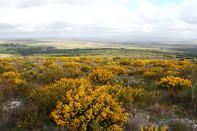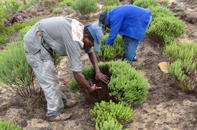Honeybush tea is produced from mostly wild-harvested honeybush cuttings. The small fynbos-like shrubs of the Cyclopia species are indigenous to South Africa and produce a caffeine-free, sweet-tasting medicinal tea, that has been used for centuries, for its health benefits and good taste. Honeybush products range from loose teas and ice teas to honeybush gin and cosmetics.

History of Honeybush Tea Production
Honeybush was first documented in the 1700s and used for medicinal purposes by the early settlers in the Cape Colony. It was later named by Swedish botanist Carl Peter Thunberg, when he discovered it while on a field trip in the Cape in the 1770s.
The first commercial honeybush transaction was in the 1930s, when honeybush was wild-harvested in the Kouga region of the Eastern Cape and sold for R0,15 per kilogram. In 1996, the first commercial harvest was picked near George in the Southern Cape, and three years later in 1999, the South African Honeybush Producers Association (SAHPA) was formed. It was then later renamed to South African Honeybush Tea Association (SAHTA).
Research on Honeybush
In the 1990s scientists at the Kirstenbosch Botanical Gardens in Cape Town, started investigating the commercial growing of honeybush. The first honeybush farming guide was launched in 2012, by the Agricultural Research Council (ARC).
Much of the research on honeybush tea production in South Africa was done by the Infruitec-Nietvoorbij Research Institute of the ARC in collaboration with the Medical Research Council (MRC). Honeybush research focuses on the production of honeybush plants, as well as the composition and quality of honeybush tea end-product.
Local Production of Honeybush Tea

According to the Department of Agriculture, Forestry and Fisheries (DAFF) production of honeybush tea in South Africa averages around 400 tonnes per year of dry tea (2016). The bulk is exported to Germany, the Netherlands, the UK and the USA.
Currently, 70 - 80% of South African honeybush is wild-harvested and the rest of honeybush tea is from commercial honeybush farms and community-based projects around the rural towns of Haarlem, Ericaville, Groendal and Genadendal.
Sustainable harvesting of wild honeybush is vital, as it will ensure consistent supply so harvesting guidelines have been developed by the Department of Environmental Affairs and Development Planning (DEA&DP).
Honeybush Production Areas in South Africa
Honeybush tea grows wild over an area of 30 000 ha of mountainous land in the Western Cape and into the Swartberg and Langeberg Mountains to the wetter parts of the Eastern Cape including the Tsitsikamma, Kouga, Baviaans Mountain ranges.
By Marinda Louw
For bulk or Honeybush Tea export enquiries please use the enquiry link below.